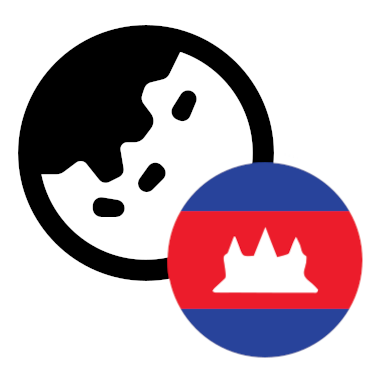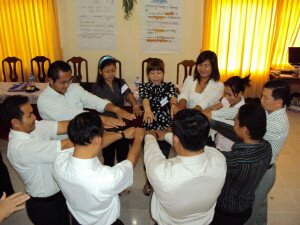
Lifelong Learning for Worldwide Change
GIZ’s Mission Statement begins, We manage change. We work holistically, draw on extensive implementation experience andshare responsibility for achieving objectives with our partners. GIZ knows that a few days or weeks at a workshop is not enough to equip participants to create effective, long-lasting change in their home communities. Connections made in person need to be strengthened over time, and ideas need time to develop into sustainable solutions. Continuous further education, lifelong learning and networking are indispensable for decision-makers and professionals.
The GIZ Alumni and Partners Programme offers the opportunity for participants to remain connected to each other, and therefore to the immense wealth of knowledge that comes from having 76,000 minds at your fingertips. The programme offers many ways, both online and in person, for alumni to stay connected and keep learning for the rest of their lives. Only through this kind of worldwide networking and knowledge-sharing can we truly tackle global challenges.
The Alumni and Partners Programme is opened all people over Cambodia who feel a permanent allegiance to Germany, its values and the concerns of international cooperation. They are united by the defining experiences they have gathered, whether during phases of work or learning in Germany or through close cooperation with GIZ programmes in the field.
Connect Globally; Act Locally
Technology is central to the effectiveness of the Alumni Programme. Since alumni come from all over the world, the Internet provides the ideal tools to establish and develop this global knowledge network. GIZ offers internet-based participation in
As the internet cannot fully replace personal relationships, the GIZ Alumni and Partners Programme offers numerous face-to-face seminars, workshops and conferences. It allows for quick access to additional professional knowledge, assists in implementing newly acquired knowledge and enables alumni to stay in touch with each other, with GIZ, and with Germany. These resources offer alumni the support they need to more effectively address the problems within their communities.
A New Kind of Social Network
Think you know the limits of what the Internet has to offer? Think again. The sites available to GIZ alumni offer a range of content and connections not available anywhere else. In addition to networking with friends, colleagues, and professional contacts made during their initial workshop or training programme, these sites enable members to build and expand their networks to include others from around the world.
Global Campus 21 offers e-learning courses, interactive workgroups, seminars, forum, and other learning platforms for alumni to engage in. The Alumni-Portal Deutschland presents social and professional networking at its best, posting job and career opportunities as well as a variety of content related to the arts and culture, science, business, education, and German language and society.
Additionally, in the fall of 2012 alone, the GIZ Alumni and Partners Programme has offered e-learning courses in Management, Marketing, and Motivation; Leadership and Strategy; and Intercultural Communication.
The Alumni Programme at Work in Cambodia
Cambodia is a priority partner country for German Development Cooperation. GIZ initiatives there focus on rural development, health and social security, and good governance. Recent Alumni and Partners Programme projects have included face-to-face social gatherings, identification of alumni, and expansion of the alumni network. The Programme led a three-part management workshop focusing on promoting the visibility of GIZ country strategic areas, soft-skill development (i.e. leadership skills, project management, and institutional development), and networking itself.
In 2012, GIZ has provided full funding outside of travel costs for 20 participants in the Khmer Rouge Tribunal (KRT) Fellowship Programme to promote reconciliation in Cambodia, a multi-week workshop including visits to Germany and the Netherlands as well as professional internships. These participants will not lose touch with each other or with the results of their learning and will maintain a lifelong connection to GIZ through the opportunities afforded by the Alumni and Partners Programme.
GIZ Alumni Collaborate on Green Strategies for the Future
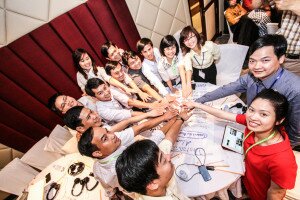
A commitment to form TVET Network within ASEAN.
07 July 2014
Siem Reap, Cambodia – GIZ support to the development of countries throughout Southeast Asia has led to a growing number of alumni over the years. The expertise and experiences of GIZ alumni have supported change and development processes within this region.
The GIZ Regional Alumni Networking Conference on Technical and Vocational Education and Training (TVET) and Green Sector in Siem Reap, Cambodia from June 12 to 14, 2014 was an opportunity for alumni to synergise, collaborate on regional cooperation in Southeast Asia and discuss cross-sectorial issues, particularly in the area of network establishment and management between the field of TVET and the green sector.
H.E. Dr. Say Samal, Minister of Environment, Cambodia opened the conference with Mr. Adelbert Eberhardt, GIZ Cambodia Country Director. In his opening remarks, H.E. Samal underlined the impact of vocational education in his country and the importance of international collaboration on subjects such as green investments and green technology.
Within three days, conference participants gained insights on the green strategies of partner countries. Alumni presented green projects from their respective countries, as well as in the final results of the transfer projects from the three ILT programmes (Master Trainer in TVET, Media Development in TVET, and TVET, Climate Change and Green Jobs) of the TVET sector.
The conference, attended by about 150 alumni programme participants and employers, also marked the close of the GIZ programme Regional Leadership and Capacity Development in TVET in Lao PDR, Indonesia and Vietnam.The joint conference aimed to:
- Recognise and promote the importance of regional cooperation both in the area of improving quality and relevance of education and training of TVET teachers and in the green sector;
- Develop proposals for regional multi-stakeholder partnerships and cooperation in fields of TVET teacher and instructor education;
- Prepare the structure and establishment of a TVET alumni network for Southeast Asia; and
- Prepare the guiding framework for the proposed Southeast Asian regional alumni network of Green Sector professionals.
From the TVET sector, each country presented how their programme was developed, structured and what the next steps are for the establishment of TVET networks. Employers from Lao PDR, Indonesia and Vietnam were invited to state
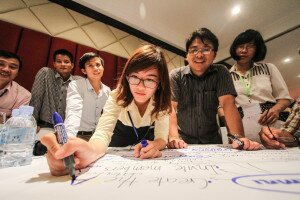
Group work on TVET Network formation.
their expectations for their national alumni networks and to develop ideas on how to support their success. The goal: to establish a regional TVET alumni network in Southeast Asia.
The conference’s green sector emphasis focused on the progress of establishing a Southeast Asian regional alumni network: a network, which could serve as an umbrella association for the Green Sector Networks of Cambodia, Indonesia, Nepal and the Philippines. As an outcome the network’s vision has been established: By 2020, to be recognised as one the prime movers in the Green Sector. Additionally, the mission of the Southeast Asia Green Sector Network (SEAGN) has been developed, organizational structures defined and an action plan through end-2014 has been decided.
The formal launch of the network has been planned November 2014 at the next network meeting, which will take place in the Philippines. Stay tuned for more information on the development of the Southeast Asia Green Sector Network.
Inauguration of Cambodian-German Friendship Association
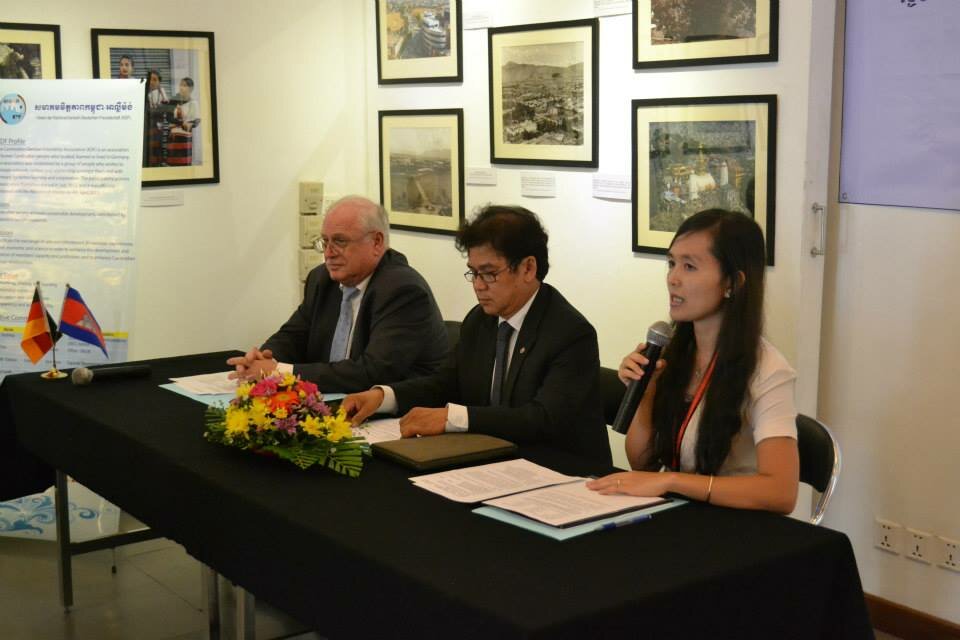
8 August 2013
Phnom Penh, Cambodia – With financial support from Deutsche Gesellschaft für Internationale Zusammenarbeit (GIZ) GmbH, Cambodian-German Friendship Association (CGF), a newly registered association held its inauguration ceremony on August 8, 2013 at the German Cambodian Cultural Center, or Meta House. The event was presided over by H.E. Khieu Tharavith, Secretary of State, Ministry of Information and H.E. Wolfgang Moser, German Ambassador to Cambodia. A total of 57 participants that include the association’s Executive Committee, advisors, members and interested participants attended the event. The gathering celebrated the Association’s inauguration, to promote public relations with all partners and stakeholders, and to encourage membership enrollments.
“I strongly believe that with the participation of its Executive Committees, General Secretary and members, the Association will flourish,” said H.E. Wolfgang Moser, German Ambassador to Cambodia.
The seminar ended with a cocktail reception to foster informal networking.
Training promotes Regional Management for Regional Rural Development
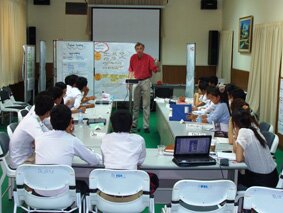
4 to 7 June 2013
Phnom Penh, Cambodia Twenty-two 3rd year students from the Royal University of Agriculture took part in a lecture series on “Rural Development through Regional Management”. Under the GIZ Programme on “Regional Rural Development through Innovative Regional Management” in Southeast Asia (Cambodia and Lao PDR) the lecture series aims to strengthen capacity in rural development in Cambodia. The focus is put on an understanding of the importance of “regions” as subnational, decentralized units (e.g. districts) as entities that can better promote development based on the needs of people in their area.
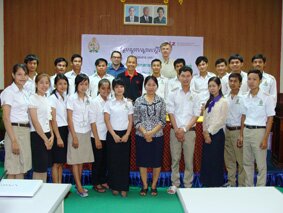
The regional management approach promotes interaction and cooperation between stakeholders of the public and private sectors and civil society. Local and regional actors and institutions identify constraints and potentials for increased incomes and employment. They work out a concept for the development of their regions and plan and implement joint initiatives to promote the local economy.
GIZ sponsored the series with the objective that regional development will be integrated into the Royal University’s curriculum.
Training programme builds capacity, improves human resources in health sector
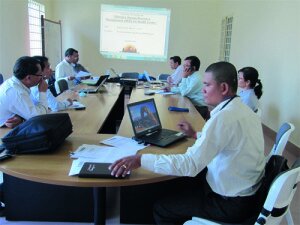
4-7 February 2013
Pursat Province, Cambodia – Effective reforms in the health sector need strong capacities at the central level for planning, implementation, management and quality assurance, as well as in stewardship and regulation. In response to this need, the Capacity Building for Effective Health (CBEH) training programme seeks to strengthen capacities of national institutions to jointly tackle challenges of the health system.
“The Capacity Building for Effective Health (CBEH) training programme is the best course that I have ever attended. It really helps us as health practitioners. The course drew the connection from theories, policies, framework into the practice,” stated Mr. Sea Sokhon, Associate Director, Strategic Behavioral Communication (SBC).
The training course addresses decision-makers’ challenges in the field of health sector strategies, policies and administrations. Participants Cambodia, Kenya, Tanzania and Vietnam exchanged lessons learnt and plan to re-apply the knowledge in their local context.
Under the training roadmap, the Cambodian team liaised as, the “Wonder Team”, has been implementing their country project with 10 health centers in Pursat Province. Five of each Operational Districts (OD) in OD Bakaan and OD Sampov Meas have been selected to implement the pilot project, “Effective HR Management for Health Center in Cambodia” for a period of six months, which commenced in January 2013. The project aims to improve the capacity of human resource management (HRM) for health managers at the facility level.
From 4-7 February 2013, the “Wonder Team” started the Pilot Site’s baseline survey. The survey assesses leadership at the 10 pilot health centres. Data analysis and reports on the survey’s finding will contribute to project design, monitoring and evaluation.
To encourage a continual exchange between the four participating countries, an international evaluation seminar will take place in Africa, in July or August this year. This seminar will bring participants together to discuss lessons learnt from project implementation and will explore ways to further improve their training approaches.
“From this programme and through our trial project implementation, we can immediately apply what we learned from a series of live workshop, online and study in Germany. It’s really amazing!” Mr. Sokhon added.
